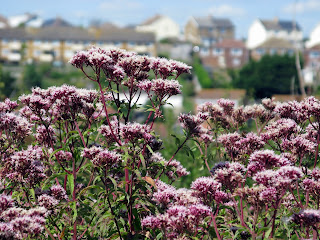I did
the week 22 walk on Sunday 27th in what for Castle Hill was
uncharacteristically calm weather. This made for good butterfly
conditions along the clifftops and there was much activity for the time
of year. I counted 366 butterflies and moths of 13 and 12 species
respectively. This is not a bad haul, but is lower than the same week in
the previous two years, when over 400 were counted. Week 22 has usually
been the final week of abundant activity at Castle Hill, so we might
find a drop in numbers next week.
 |
| Straw Conch (Cochylimorpha straminea) |
I
don't want to get too carried away with excitement, but there has been
something special happening this year for the Small Heath butterfly. I
have been recording more than 130 at Rookery Hill in Bishopstone on some
days recently and, on Sunday, I recorded nearly as many Small Heaths in
one day (96) as we counted in the six years
between 2011 and 2016 (113 in total during this period). Both Dave
Harris and the County Lepidoptera Recorder, Colin Pratt, have commented
that this butterfly appears to have recovered to its pre-decline 1970
population level. Let's hope it is sustained in the coming years. Isn't
it wonderful to have a success story for once when considering the
plight of so many other species?!!
Amongst the moths, I recorded our first Straw Conch (Cochylimorpha
straminea) in seven years at the reserve and saw more of the Common Grass Veneer (Agriphila tristella)
than we've ever counted before in a single day. This moth is having a
good season and has been seen in good numbers everywhere recently. This
distinctive moth, which has a pale streak running along the length of
its wing, flies out of the grass ahead of you when you walk along
country paths in the late summer and lands a few metres ahead, parallel
with a grass stem.
 |
| Purple Loosestrife |
Other
items of interest include some purple loosestrife found growing by the
'old pond' (Dave tells me this is a new plant species for the reserve
list) and some birds including a female Wheatear, two ravens and a
sparrowhawk all along the clifftop.
Amongst
the photos I've included is a shot of a hazy Seaford Bay. This haze is
the infamous cloud that affected people later in the day on the beaches
between Birling Gap and Hastings. When the weather is settled and sunny,
an accumulation of pollutants such as oxides of nitrogen and other
volatile compounds react with UV in strong sunlight to create ozone at
low levels. This 'photochemical smog' causes severe irritation to eyes,
nose and throat upon exposure. Air quality data measured at the
Lullington Heath station on the same day showed a large spike in ozone
levels. Thankfully those people at Newhaven's West Beach were not so
affected.
Hopefully there will be no such hazards for Dave during week 23.
 |
| Low-level ozone at Seaford Head? |
 |
| Late summer colour in the Wassail Glade at Castle Hill LNR |
25 species (13 butterfly, 12 moth); 366 individuals.
Large White (Pieris
brassicae) 21
Small White (Pieris
rapae) 68
Green-veined White (Pieris
napi) 1
Clouded Yellow (Colias croceus) 2
Speckled Wood (Pararge aegeria) 19
Small Heath (Coenonympha
pamphilus) 96 – highest numbers ever seen at CHLNR
Meadow Brown (Maniola
jurtina) 65
Gatekeeper (Pyronia
tithonus) 1
Red Admiral (Vanessa
atalanta) 6
Painted Lady (Vanessa
cardui) 1
Small Copper (Lycaena
phlaeas) 4
Holly Blue (Celastrina
argiolus) 2
Common Blue (Polyommatus
icarus) 25
Golden Pigmy (Stigmella
aurella) leaf-mines on bramble
Bordered Carl (Coptotriche
marginea) leaf-mines on bramble
Apple Leaf Miner (Lyonetia
clerkella) leaf-mines on apple and cherry
Common Nettle-tap (Anthophila
fabriciana) 3
Straw Conch (Cochylimorpha
straminea) 2 – first site record since 2010
Straw-barred Pearl (Pyrausta
despicata) 10
Rusty-dot Pearl (Udea
ferrugalis) 1
Rush Veneer (Nomophila
noctuella) 3
Common Grass-veneer (Agriphila
tristella) 32 – best numbers ever seen at CHLNR
Common Carpet (Epirrhoe
alternata) 1
Vapourer (Orgyia
antiqua) 1
Silver Y (Autographa gamma) 2







